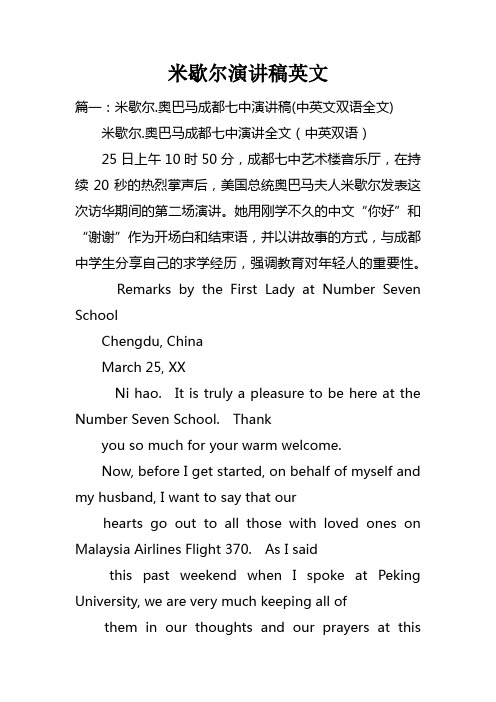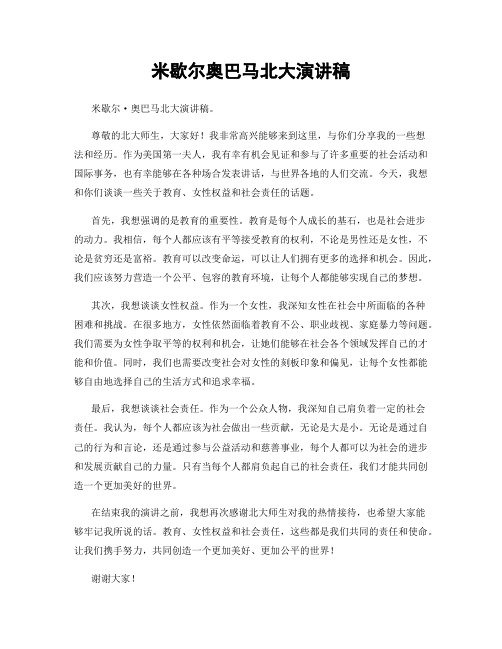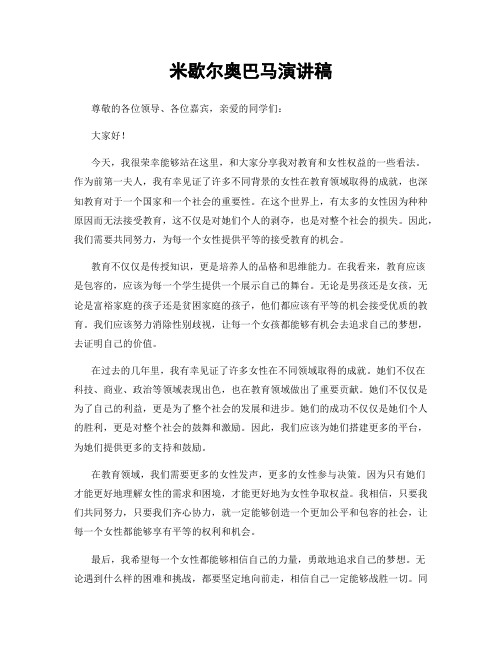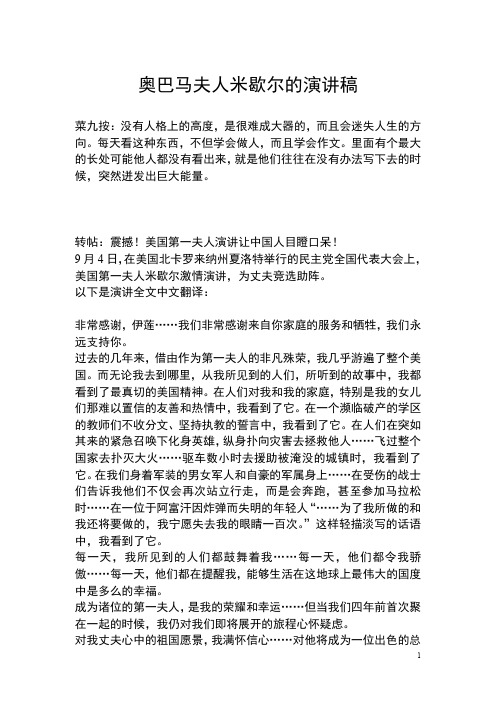【推荐下载】米歇尔·奥巴马演讲-女孩受教育的重要性-范文模板 (1页)
奥巴马对学生的演讲

奥巴马:责任与梦想(我们的教育我们的未来)(2009年9月8日弗吉尼亚州阿灵顿威克菲尔德高中)大家好,大家今天都好吗?我现在是和弗吉尼亚州威克菲尔德高中的学生在一起。
全国各地的学生,从幼儿园到12年级,也都在收听。
我很高兴你们大家今天都参与了进来。
问候大家并告知演讲的地点,使电视前的观众具有现场感。
我知道对你们中的很多人来说,今天是开学第一天。
而对于那些在幼儿园或是刚刚开始初中或高中生涯的你来说,今天还是你们在新学校的第一天,所以你们难免会有一点紧张,这是很可以理解的。
我还想象着今天会有一些高年级学生这会儿可能感觉挺不错的,因为还有一年就可以毕业了。
不管现在你们上几年级了,有些人可能希望现在还是夏天,今天早上可能还会有点不想起床。
揣摩学生的心理。
面对他们全体讲话。
很有亲和力。
我完全理解这种感觉。
在我小的时候,我们家在印度尼西亚生活过几年。
那时候我妈妈没有足够的钱送我去全是美国孩子念书的学校。
所以她决定自己给我额外补一些课,开始于周一到周五的每天早上4:30。
起这么早我可是不怎么有愉快的心情。
很多次,我就趴在厨房的桌子上睡着了。
但是每一次我要抱怨的时候,我妈妈就会那样看着我说:“这对我来说也不是什么享受,小家伙。
”结合自己的经历讲故事,让大家感到原来总统也跟我们一样也不想起床读书。
拉近与学生的心理距离所以我知道你们中有一些人还在调整自己重返学校。
但是我今天在这里的原因是有一些重要的事情想和你们商讨。
我在这里是因为想和你们谈谈你们的学习,在新学年里对大家的期望。
转入正式话题,让大家充满期待。
关于教育我做了很多次演讲了。
而且有关责任我也谈了很多。
我已经谈过了你们的教师启发你们,推动你们学习的责任。
我讲过了你们的父母让你们坚持学习,做家庭作业,不要整天看电视,玩Xbox 的责任。
我讲了很多政府制定高标准,支持教师和校长,改善那些运转不良以至于学生得不到应有机会的那些学校的责任。
但是最后,我们可以有最专注的教师,最支持的父母,以及世界上最好的学校,而只有当你们都履行了你们的责任时,这些因素才能发挥作用。
米歇尔演讲稿英文doc

米歇尔演讲稿英文篇一:米歇尔.奥巴马成都七中演讲稿(中英文双语全文) 米歇尔.奥巴马成都七中演讲全文(中英双语)25日上午10时50分,成都七中艺术楼音乐厅,在持续20秒的热烈掌声后,美国总统奥巴马夫人米歇尔发表这次访华期间的第二场演讲。
她用刚学不久的中文“你好”和“谢谢”作为开场白和结束语,并以讲故事的方式,与成都中学生分享自己的求学经历,强调教育对年轻人的重要性。
Remarks by the First Lady at Number Seven SchoolChengdu, ChinaMarch 25, XXNi hao. It is truly a pleasure to be here at the Number Seven School. Thankyou so much for your warm welcome.Now, before I get started, on behalf of myself and my husband, I want to say that ourhearts go out to all those with loved ones on Malaysia Airlines Flight 370. As I saidthis past weekend when I spoke at Peking University, we are very much keeping all ofthem in our thoughts and our prayers at thistremendously difficult time.So now, let me start by thanking your Principal, Principal Liu, and your classmate,Ju Chao, for that wonderful introduction. Your English, Ju Chao, is excellent, andyou should be very proud. Thank you so much. (Applause.) And I want to thankall of the students here today, both those of you here in person and those of youjoining remotely from across the region. I’m thrilled to be visiting your wonderfulschool.Now, in preparation for this visit, before I left the U.S. I visited the Yu Ying School.It’s a public school near the White House in Washington, D.C., and all of the studentsat this school study Chinese. And I met with the sixth-grade class, kids who are 11and 12 years old. They had recently taken a trip here to China, and they werebursting with excitement. They were eager to tell me about everything about whatthey had seen.But they admitted that before their trip, they had all kinds of misconceptions aboutChina. They thought they would see palaces and temples everywhere they went, butinstead they found massive cities filled with skyscrapers. They weren’t sure thatthey’d like the food here in China, but they actually loved it, and they learned how touse chopsticks. And in the end, one of the students told me –- and this is his quote-- he said, “Coming home was really exciting, but was at the same time sad.”Now, meeting these students reminded me that when we live so far away fromeach other, it’s easy to develop all kinds of misconceptions and stereotypes. It’seasy to focus on our differences –- how we speak different languages and eatdifferent foods and observe different traditions. But as I travel the world, and I meetyoung people from so many countries, I’m alwaysstruck by how much more we havein common. And that’s been particularly true during my visit here in China.You see, the truth is that I grew up like many of you. My mom, my dad, mybrother and I, we lived in a tiny apartment in Chicago, which is one of the largestcities in America. My father worked at the local water plant. And we didn’t havemuch money, but our little home was bursting with love. Every evening, my familywould laugh and share stories over dinner. We’d play card games and have fun forhours. And on summer nights, I remember, when our apartment got too hot, we’dall sleep outside on our back porch.Family meant everything to us, including our extended family. My grandparentslived nearby, and my elderly great aunt and uncle lived in the apartment downstairsfrom us. And when their health started to decline my parents stepped in, helping myuncle shave and dress each morning, dashing downstairs in the middle of the night tocheck on my aunt.So in my family, like in so many of your families, we took care of each other.And while we certainly weren’t rich, my parents had big dreams for me and mybrother. They had only a high school education themselves, but they weredetermined to send us both to universities.So they poured all of their love and all of their hope into us, and they worked hard.They saved every penny. And I know that wasn’t easy for them, especially for myfather. You see, my father had a serious illness called multiple sclerosis. And as hegot sicker, it got harder for him to walk, and it took him longer to get dressed in themorning.But no matter how tired he felt, no matter how much pain he was in, my fatherhardly ever missed a day of work, because he wasdetermined to give me and mybrother a better life. And every day, like so many of you, I felt the weight of myparents’sacrifices on my shoulders. Every day, I wanted to make them proud.So while most American kids attend public schools near their homes, when it wastime for me to attend high school, I took an exam and got into a special public highschool where I could get a better education. But the school was very far from myhome, so I had to get up early every morning and ride a bus for an hour, sometimes anhour and a half if the weather was bad. And every afternoon, I’d ride that same busback home and then immediately start my homework, often studying late into thenight -- and sometimes I would wake up at 4:30 or 5:00 in the morning to study evenmore.And it wasn’t easy. But whenever I got tired or discouraged, I would just thinkabout how hard my parents were working for me. And I would remember somethingmy mother always told me –- she said: “A good education is something that noone can take away from you.”And when it was time for me to apply to university, I had many options, because inAmerica, there are many kinds of universities. There are four-year universities.There are two-year community colleges which are less expensive. There areuniversities where you take classes at night while working during the day. So youdon’t have to be a top student to attend a university. And even if your parents don’t have much money or you live in a tiny town in a rural area, in America, you can stillattend university. And you can get scholarships and government loans to help payyour tuition.So I attended Princeton University for my undergraduate degree, and I went onto Harvard University for my graduate degree in law. And with those degrees I wasable to become a lawyer at a large law firm, and then I worked as an executive at acity hospital, and then I was the director of an organization that helped disadvantagedyoung people.And my story isn’t unusual in America. Some of our most famous athletes, likeLeBron James, and artists, like the singer Janelle Monae, came from strugglingfamilies like mine, as do many business leaders –like Howard Schultz. He’s thehead of a company called Starbucks, which many of you may have heard of. WhenMr. Schultz was a boy his father lost his job, leaving their family destitute. But Mr.Schultz worked hard. He got a scholarship to a university, and eventually built thelargest coffeehouse company in the world.And then there’s this other guy I know who was raised by a single mother whosometimes struggled to afford food for their family. But like me, this guy gotscholarships and loans to attend universities. He became a lawyer and a professor,and then he was a state senator and then a national senator. And then, he becamePresident of the United States. This guy I’m talking about is my husband, BarackObama. (Applause.)These stories are the stories of so many Americans, and of America itself.Because in America, we believe that no matter where you live or how much moneyyour parents have, or what race or religion or ethnicity you are, if you work hard andbelieve in yourself, then you should have a chance to succeed. We also believe thateveryone is equal, and that we all have the right to say what we think and worship aswe choose, even when others don’t like what we say or don’t always agree with whatwe believe.Now of course, living up to these ideals isn’t always easy. And there have beentimes in our history where we have fallen short. Many decades ago, there wereactually laws in America that allowed discrimination against black people like me,who are a minority in the United States. But over time, ordinary citizens decidedthat those laws were unfair. So they held peaceful protests and marches. Theycalled on government officials to change those laws, and they voted to elect newofficials who shared their views.And slowly but surely, America changed. We got rid of those unjust laws. Andtoday, just 50 years later, my husband and I are President and First Lady of the UnitedStates. And that is really the story of America –- how over the course of our shorthistory, through so many trials and struggles, we have become more equal, moreinclusive, and more free.And today in America, people of every race, religion and ethnicity live togetherand work together to build a better life for their children and grandchildren. And inthe end, that deep yearning to leave something better for those who come after us, thatis something we all truly share. In fact, there’s a Chinese saying that I love that says,“To achieve true happiness, help the next generation.”And like so many of your parents, my parents sacrificed so much so that I could haveopportunities they never dreamed of. And today, as a mother myself, I want evenmore opportunities for my own daughters. But of course, as I always tell mydaughters, with opportunities come obligations.And that is true for all of you as well. You all have the opportunity to receive aneducation from this wonderful school, and you all have an obligation to take thefullest advantage of this opportunity. And I knowthat’s exactly what you all aredoing.You’re winning prizes in math and science. Here, you are staging musicalperformances around the world. You’re volunteering in your communities. Andmany of you are working hard to get an education your parents never dreamed of.So you all have so much to offer –- and that’s a good thing, because the worldneeds your talent. The world needs your creativity and energy more than ever before.Because we face big challenges that know no borders –- like improving the qualityof our air and water, ensuring that people have good jobs, stopping the spread ofdisease. And soon, it will all fall to all of you to come together with people on everycontinent and solve these problems together.Now, fortunately, here at this wonderful school, you’re already well on your way.For more than a decade, you’ve been buildingspecial relationships with a Americanschool in -- an American high school, and many of you will attend universities inAmerica or find other ways to reach out beyond your borders.So in the years ahead, much like you and I are doing here today, you will becreating bonds of friendship across the globe that will last for decades to come. Andover the past week, as I have seen both the ancient wonders and the modernachievements of your fascinating country, and as I’ve met with extraordinary youngpeople like all of you, I am more confident than ever before in our shared future.And I cannot wait to see everything that you will achieve here in China and aroundthe world.Thank you again for hosting me and my family at this extraordinary school, and Iwish you all the best of luck in your journey ahead. Xie-Xie. (Applause.)米歇尔在成都七中演讲全文奇速英语整理你好。
米歇尔奥巴马北大演讲稿

米歇尔奥巴马北大演讲稿米歇尔·奥巴马北大演讲稿。
尊敬的北大师生,大家好!我非常高兴能够来到这里,与你们分享我的一些想法和经历。
作为美国第一夫人,我有幸有机会见证和参与了许多重要的社会活动和国际事务,也有幸能够在各种场合发表讲话,与世界各地的人们交流。
今天,我想和你们谈谈一些关于教育、女性权益和社会责任的话题。
首先,我想强调的是教育的重要性。
教育是每个人成长的基石,也是社会进步的动力。
我相信,每个人都应该有平等接受教育的权利,不论是男性还是女性,不论是贫穷还是富裕。
教育可以改变命运,可以让人们拥有更多的选择和机会。
因此,我们应该努力营造一个公平、包容的教育环境,让每个人都能够实现自己的梦想。
其次,我想谈谈女性权益。
作为一个女性,我深知女性在社会中所面临的各种困难和挑战。
在很多地方,女性依然面临着教育不公、职业歧视、家庭暴力等问题。
我们需要为女性争取平等的权利和机会,让她们能够在社会各个领域发挥自己的才能和价值。
同时,我们也需要改变社会对女性的刻板印象和偏见,让每个女性都能够自由地选择自己的生活方式和追求幸福。
最后,我想谈谈社会责任。
作为一个公众人物,我深知自己肩负着一定的社会责任。
我认为,每个人都应该为社会做出一些贡献,无论是大是小。
无论是通过自己的行为和言论,还是通过参与公益活动和慈善事业,每个人都可以为社会的进步和发展贡献自己的力量。
只有当每个人都肩负起自己的社会责任,我们才能共同创造一个更加美好的世界。
在结束我的演讲之前,我想再次感谢北大师生对我的热情接待,也希望大家能够牢记我所说的话。
教育、女性权益和社会责任,这些都是我们共同的责任和使命。
让我们携手努力,共同创造一个更加美好、更加公平的世界!谢谢大家!。
米歇尔奥巴马演讲稿

米歇尔奥巴马演讲稿尊敬的各位领导、各位嘉宾,亲爱的同学们:大家好!今天,我很荣幸能够站在这里,和大家分享我对教育和女性权益的一些看法。
作为前第一夫人,我有幸见证了许多不同背景的女性在教育领域取得的成就,也深知教育对于一个国家和一个社会的重要性。
在这个世界上,有太多的女性因为种种原因而无法接受教育,这不仅是对她们个人的剥夺,也是对整个社会的损失。
因此,我们需要共同努力,为每一个女性提供平等的接受教育的机会。
教育不仅仅是传授知识,更是培养人的品格和思维能力。
在我看来,教育应该是包容的,应该为每一个学生提供一个展示自己的舞台。
无论是男孩还是女孩,无论是富裕家庭的孩子还是贫困家庭的孩子,他们都应该有平等的机会接受优质的教育。
我们应该努力消除性别歧视,让每一个女孩都能够有机会去追求自己的梦想,去证明自己的价值。
在过去的几年里,我有幸见证了许多女性在不同领域取得的成就。
她们不仅在科技、商业、政治等领域表现出色,也在教育领域做出了重要贡献。
她们不仅仅是为了自己的利益,更是为了整个社会的发展和进步。
她们的成功不仅仅是她们个人的胜利,更是对整个社会的鼓舞和激励。
因此,我们应该为她们搭建更多的平台,为她们提供更多的支持和鼓励。
在教育领域,我们需要更多的女性发声,更多的女性参与决策。
因为只有她们才能更好地理解女性的需求和困境,才能更好地为女性争取权益。
我相信,只要我们共同努力,只要我们齐心协力,就一定能够创造一个更加公平和包容的社会,让每一个女性都能够享有平等的权利和机会。
最后,我希望每一个女性都能够相信自己的力量,勇敢地追求自己的梦想。
无论遇到什么样的困难和挑战,都要坚定地向前走,相信自己一定能够战胜一切。
同时,我也希望每一个男性都能够尊重和支持女性,让我们共同努力,创造一个更加美好的未来。
谢谢大家!。
米歇尔演讲稿英文doc

米歇尔演讲稿英文篇一:米歇尔.奥巴马成都七中演讲稿(中英文双语全文) 米歇尔.奥巴马成都七中演讲全文(中英双语)25日上午10时50分,成都七中艺术楼音乐厅,在持续20秒的热烈掌声后,美国总统奥巴马夫人米歇尔发表此次访华期间的第二场演讲。
她用刚学不久的中文“你好”和“谢谢”作为开场白和结束语,并以讲故事的方式,与成都中学生分享自己的求学经历,强调教育对年轻人的重要性。
Remarks by the First Lady at Number Seven School Chengdu, ChinaMarch 25, XXNi hao. It is truly a pleasure to be here at the Number Seven School. Thankyou so much for your warm welcome.Now, before I get started, on behalf of myself and my husband, I want to say that ourhearts go out to all those with loved ones on Malaysia Airlines Flight 370. As I saidthis past weekend when I spoke at Peking University, we are very much keeping all ofthem in our thoughts and our prayers at this tremendously difficult time.So now, let me start by thanking your Principal, Principal Liu, and your classmate,Ju Chao, for that wonderful introduction. Your English, Ju Chao, is excellent, andyou should be very proud. Thank you so much. (Applause.) And I want to thankall of the students here today, both those of you here in person and those of youjoining remotely from across the region. I’m thrilled to be visiting your wonderfulschool.Now, in preparation for this visit, before I left the U.S. I visited the Yu Ying School.It’s a public school near the White House in Washington, D.C., and all of the studentsat this school study Chinese. And I met with the sixth-grade class, kids who are 11and 12 years old. They had recently taken a trip here to China, and they werebursting with excitement. They were eager to tell me about everything about whatthey had seen.But they admitted that before their trip, they had all kinds of misconceptions aboutChina. They thought they would see palaces and temples everywhere they went, butinstead they found massive cities filled with skyscrapers. They weren’t sure thatthey’d like the food here in China, but they actually loved it, and they learned how touse chopsticks. And in the end, one of the students told me –- and this is his quote-- he said, “Coming home was really exciting, but was at the same time sad.”Now, meeting these students reminded me that when we live so far away fromeach other, it’s easy to develop all kinds of misconceptions and stereotypes. It’seasy to focus on our differences –- how we speak different languages and eatdifferent foods and observe different traditions. But as I travel the world, and I meetyoung people from so many countries, I’m always struck by how much more we havein common. And that’s been particularly true during my visit here in China.You see, the truth is that I grew up like many of you. My mom, my dad, mybrother and I, we lived in a tiny apartment in Chicago, which is one of the largestcities in America. My father worked at the local water plant. And we didn’t havemuch money, but our little home was bursting with love. Every evening, my familywould laugh and share stories over dinner. We’d play card games and have fun forhours. And on summer nights, I remember, when our apartment got too hot, we’dall sleep outside on our back porch.Family meant everything to us, including our extended family. My grandparentslived nearby, and my elderly great aunt and uncle lived in the apartment downstairsfrom us. And when their health started to decline my parents stepped in, helping myuncle shave and dress each morning, dashingdownstairs in the middle of the night tocheck on my aunt.So in my family, like in so many of your families, we took care of each other.And while we certainly weren’t rich, my parents had big dreams for me and mybrother. They had only a high school education themselves, but they weredetermined to send us both to universities.So they poured all of their love and all of their hope into us, and they worked hard.They saved every penny. And I know that wasn’t easy for them, especially for myfather. You see, my father had a serious illness called multiple sclerosis. And as hegot sicker, it got harder for him to walk, and it took him longer to get dressed in themorning.But no matter how tired he felt, no matter how much pain he was in, my fatherhardly ever missed a day of work, because he was determined to give me and mybrother a better life. And every day, like so many of you, I felt the weight of myparents’ sacrifices on my shoulders. Every day, I wanted to make them proud.So while most American kids attend public schools near their homes, when it wastime for me to attend high school, I took an exam and got into a special public highschool where I could get a better education. But the school was very far from myhome, so I had to get up early every morning and ride a bus for an hour, sometimes anhour and a half if the weather was bad. And every afternoon, I’d ride that same busback home and then immediately start my homework, often studying late into thenight -- and sometimes I would wake up at 4:30 or 5:00 in the morning to study evenmore.And it wasn’t easy. But whenever I got tired or discouraged, I would just thinkabout how hard my parents were working for me. AndI would remember somethingmy mother always told me –- she said: “A good education is something that noone can take away from you.”And when it was time for me to apply to university,I had many options, because inAmerica, there are many kinds of universities. There are four-year universities.There are two-year community colleges which are less expensive. There areuniversities where you take classes at night while working during the day. So youdon’t have to be a top student to attend a university. And even if your parents don’t have much money or you live in a tiny town in a rural area, in America, you can stillattend university. And you can get scholarships and government loans to help payyour tuition.So I attended Princeton University for my undergraduate degree, and I went onto Harvard University for my graduate degree in law.And with those degrees I wasable to become a lawyer at a large law firm, and then I worked as an executive at acity hospital, and then I was the director of an organization that helped disadvantagedyoung people.And my story isn’t unusual in America. Some of our most famous athletes, likeLeBron James, and artists, like the singer Janelle Monae, came from strugglingfamilies like mine, as do many business leaders –like Howard Schultz. He’s thehead of a company called Starbucks, which many of you may have heard of. WhenMr. Schultz was a boy his father lost his job, leaving their family destitute. But Mr.Schultz worked hard. He got a scholarship to a university, and eventually built thelargest coffeehouse company in the world.And then there’s this other guy I know who was raised by a single mother whosometimes struggled to afford food for their family.But like me, this guy gotscholarships and loans to attend universities. He became a lawyer and a professor,and then he was a state senator and then a national senator. And then, he becamePresident of the United States. This guy I’m talking about is my husband, BarackObama. (Applause.)These stories are the stories of so many Americans, and of America itself.Because in America, we believe that no matter where you live or how much moneyyour parents have, or what race or religion or ethnicity you are, if you work hard andbelieve in yourself, then you should have a chance to succeed. We also believe thateveryone is equal, and that we all have the right to say what we think and worship aswe choose, even when others don’t like what we say or don’t always agree with whatwe believe.Now of course, living up to these ideals isn’t always easy. And there have beentimes in our history where we have fallen short. Many decades ago, there wereactually laws in America that allowed discrimination against black people like me, who are a minority in the United States. But over time, ordinary citizens decidedthat those laws were unfair. So they held peaceful protests and marches. Theycalled on government officials to change those laws, and they voted to elect newofficials who shared their views.And slowly but surely, America changed. We got rid of those unjust laws. Andtoday, just 50 years later, my husband and I are President and First Lady of the UnitedStates. And that is really the story of America –- how over the course of our shorthistory, through so many trials and struggles, we have become more equal, moreinclusive, and more free.And today in America, people of every race,religion and ethnicity live togetherand work together to build a better life for their children and grandchildren. And inthe end, that deep yearning to leave something better for those who come after us, thatis something we all truly share. In fact, there’s a Chinese saying that I love that says,“To achieve true happiness, help the next generation.”And like so many of your parents, my parents sacrificed so much so that I could haveopportunities they never dreamed of. And today, as a mother myself, I want evenmore opportunities for my own daughters. But of course, as I always tell mydaughters, with opportunities come obligations.And that is true for all of you as well. You all have the opportunity to receive aneducation from this wonderful school, and you all have an obligation to take thefullest advantage of this opportunity. And I know that’s exactly what you all aredoing.You’re winning prizes in math and science. Here, you are staging musicalperformances around the world. You’re volunteering in your communities. Andmany of you are working hard to get an education your parents never dreamed of.So you all have so much to offer –- and that’s a good thing, because the worldneeds your talent. The world needs your creativity and energy more than ever before.Because we face big challenges that know no borders –- like improving the qualityof our air and water, ensuring that people have good jobs, stopping the spread ofdisease. And soon, it will all fall to all of you to come together with people on everycontinent and solve these problems together.Now, fortunately, here at this wonderful school, you’re already well on your way.For more than a decade, you’ve been building special relationships with a Americanschool in -- an American high school, and many of you will attend universities inAmerica or find other ways to reach out beyond your borders.So in the years ahead, much like you and I are doing here today, you will becreating bonds of friendship across the globe that will last for decades to come. Andover the past week, as I have seen both the ancient wonders and the modernachievements of your fascinating country, and as I’ve met with extraordinary youngpeople like all of you, I am more confident than ever before in our shared future.And I cannot wait to see everything that you will achieve here in China and aroundthe world.Thank you again for hosting me and my family at this extraordinary school, and Iwish you all the best of luck in your journey ahead. Xie-Xie. (Applause.)米歇尔在成都七中演讲全文奇速英语整理你好。
英语演讲稿-奥巴马每周电视演讲:总统妇女节发表讲话 让女孩去上学(中英lrc)

英语演讲稿奥巴马每周电视演讲:总统妇女节发表讲话让女孩去上学(中英lrc)Weekly Address: Let Girls Learn (March 07, 2015)奥巴马每周电视讲话:总统妇女节发表讲话让女孩去上学Hi, everybody. Sunday is International Women’s Day-a day to celebrate remarkable women and girls worldwide, and to re-dedicate ourselves to defending the fundamental rights and dignity of all people.大家好!周日是国际妇女节,这是全世界妇女和女海的节日,同样值此节日也提醒我们继续投身于捍卫全人类最基本的权力和尊严。
That’s why, this week, Michelle and I launched a new initiative on a topic that’s close to both our hearts: girls’education.正因如此,本周米歇尔和我提出了一项我们非常关心的计划:女孩子的教育。
It’s called “Let Girls Learn.” And its goal is to helpmore girls around the world go to school and stay in school. Right now, 62 million girls who should be in school, are not. And that’s not an accident. It’s the direct result of barriers, large and small, that stand in the way of girls who want to learn.这个名为《让女孩上学》的计划目标是帮助。
奥巴马夫人米歇尔的演讲稿

奥巴马夫人米歇尔的演讲稿菜九按:没有人格上的高度,是很难成大器的,而且会迷失人生的方向。
每天看这种东西,不但学会做人,而且学会作文。
里面有个最大的长处可能他人都没有看出来,就是他们往往在没有办法写下去的时候,突然迸发出巨大能量。
转帖:震撼!美国第一夫人演讲让中国人目瞪口呆!9月4日,在美国北卡罗来纳州夏洛特举行的民主党全国代表大会上,美国第一夫人米歇尔激情演讲,为丈夫竞选助阵。
以下是演讲全文中文翻译:非常感谢,伊莲……我们非常感谢来自你家庭的服务和牺牲,我们永远支持你。
过去的几年来,借由作为第一夫人的非凡殊荣,我几乎游遍了整个美国。
而无论我去到哪里,从我所见到的人们,所听到的故事中,我都看到了最真切的美国精神。
在人们对我和我的家庭,特别是我的女儿们那难以置信的友善和热情中,我看到了它。
在一个濒临破产的学区的教师们不收分文、坚持执教的誓言中,我看到了它。
在人们在突如其来的紧急召唤下化身英雄,纵身扑向灾害去拯救他人……飞过整个国家去扑灭大火……驱车数小时去援助被淹没的城镇时,我看到了它。
在我们身着军装的男女军人和自豪的军属身上……在受伤的战士们告诉我他们不仅会再次站立行走,而是会奔跑,甚至参加马拉松时……在一位于阿富汗因炸弹而失明的年轻人“……为了我所做的和我还将要做的,我宁愿失去我的眼睛一百次。
”这样轻描淡写的话语中,我看到了它。
每一天,我所见到的人们都鼓舞着我……每一天,他们都令我骄傲……每一天,他们都在提醒我,能够生活在这地球上最伟大的国度中是多么的幸福。
成为诸位的第一夫人,是我的荣耀和幸运……但当我们四年前首次聚在一起的时候,我仍对我们即将展开的旅程心怀疑虑。
对我丈夫心中的祖国愿景,我满怀信心……对他将成为一位出色的总统,我也深信不疑……但是就像所有的母亲一样,我也曾担心如果他当选,这对我们的女儿们意味着什么。
身处万众瞩目的聚光灯下,我们要如何让他们保持脚踏实地?当他们被迫离开从小熟悉的家、学校、和朋友时,会有什么感受?在搬到华盛顿之前,我们的生活充满简单的快乐……周六参加足球赛,周日则在祖母家……还有巴拉克和我的约会之夜,我们要么出去晚餐,要么去看场电影,因为作为一个筋疲力尽的老妈,我实在没法同时去晚餐和电影还不打瞌睡。
米歇尔演讲稿

米歇尔演讲稿
尊敬的各位领导、老师、亲爱的同学们:
大家好!今天我非常荣幸能够站在这里,向大家分享我的一些
观点和想法。
我相信,每个人都有自己独特的价值观和人生经验,
而今天我想和大家分享的主题是“米歇尔演讲稿”。
米歇尔·奥巴马是一位非常杰出的女性,她不仅是美国第一夫人,更是一位充满智慧和魅力的领袖。
她在任期内积极倡导健康生
活和教育平等,成为了全球范围内的榜样和榜样。
她的演讲稿总是
充满力量和感染力,让人们深受启发和鼓舞。
在她的演讲稿中,我学到了很多关于领导力、坚持和梦想的重
要观念。
她鼓励人们勇于追求自己的梦想,不要被外界的质疑和困
难所阻挠。
她还强调了教育的重要性,呼吁人们要珍惜学习的机会,不断提升自己的知识和技能。
除此之外,米歇尔的演讲稿还教会了我如何在逆境中保持坚强,如何用自己的行动去影响他人,以及如何在成为一名优秀领袖的道
路上不断成长和进步。
在我看来,米歇尔的演讲稿不仅是一种言辞的表达,更是一种精神的传递。
她用自己的亲身经历和智慧,激励了无数人,让他们重新点燃对生活的热爱和对未来的希望。
最后,我想借此机会呼吁大家,让我们一起学习和借鉴米歇尔的演讲风格和思想,不断提升自己的修养和能力,成为更加优秀和有影响力的人。
让我们共同努力,为实现自己的梦想和为社会的发展进步贡献自己的力量!
谢谢大家!。
- 1、下载文档前请自行甄别文档内容的完整性,平台不提供额外的编辑、内容补充、找答案等附加服务。
- 2、"仅部分预览"的文档,不可在线预览部分如存在完整性等问题,可反馈申请退款(可完整预览的文档不适用该条件!)。
- 3、如文档侵犯您的权益,请联系客服反馈,我们会尽快为您处理(人工客服工作时间:9:00-18:30)。
【推荐下载】米歇尔·奥巴马演讲:女孩受教育的重要性-范文模板
本文部分内容来自网络,本司不为其真实性负责,如有异议或侵权请及时联系,本司将予以删除!
== 本文为word格式,下载后可随意编辑修改! ==
米歇尔·奥巴马演讲:女孩受教育的重要性
【米歇尔·奥巴马演讲:女孩受教育的重要性】
全球范围内,有6200万女孩不能上学。
尽管每个发展中国家或地区都或多或少地在实现或接近实现基础教育中的
性别平等。
但到了中等教育层面女孩们还是被落在了后面。
女孩们去上中学,往往是冒着巨大的风险的。
就像我们在巴基斯坦看到的那样,马拉拉尤沙夫赛被塔利班武装分子击中头部。
在尼日利亚,超过200名女
孩被从学校宿舍绑架,被博科圣地的恐怖分子挟持。
在全球的许多国家,青春
期的女孩被骚扰哦,受到性攻击,或是在去学校的路上被迷药迷昏。
即便女孩们顺利完成了中学学业,甚至是大学学业。
在很多国家,她们在
毕业后却发现,没有地方给她们工作,没有地方能让她们去施展她们努力学来
的技能。
所以我觉得,我们可以一致认为,我们需要大量的新的投资投入到女子教
育中。
我们应该为女孩们雇佣更多的老师,我们要提供安全的交通方式、洗浴
设备、卫生设施,为这个姑娘们。
我们得让她们接触新技术,训练她们做一些
高精尖的工作。
我们在基础教育中实现了性别平等,但在中等教育中没有。
因
为当女孩们还很小的时候,她们只是被当做孩子看待。
一旦她们进入了青春期,她们开始要成长为女人了。
她们就突然要开始面对,周围社会上的性别偏见的。
这也正是,她们在教育上落后的开始。
所以没错,解决女子教育危机,关键在
于资源但更在于态度和信念。
这取决于家长们是否觉得女儿们和儿子们一样有
受教育的价值。
这取决于我们的社会是不是仍然沿袭着陈旧的法律和风俗去抑
制并排除女性,以及人们是不是能把女性看作是完整的具有平等权利的公民。
我坚信,只要我们做了。
男孩们,女孩们,无论他们来自什么背景。
都有
一个配得上,他们的天赋与梦想的未来。
